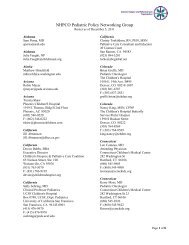CORPORATE PRACTICE OF MEDICINE DOCTRINE 50 STATE ...
CORPORATE PRACTICE OF MEDICINE DOCTRINE 50 STATE ...
CORPORATE PRACTICE OF MEDICINE DOCTRINE 50 STATE ...
You also want an ePaper? Increase the reach of your titles
YUMPU automatically turns print PDFs into web optimized ePapers that Google loves.
<strong>CORPORATE</strong> <strong>PRACTICE</strong> <strong>OF</strong> <strong>MEDICINE</strong> <strong>DOCTRINE</strong><br />
<strong>50</strong> <strong>STATE</strong> SURVEY SUMMARY<br />
Mary H. Michal, J.D.<br />
Meg S.L. Pekarske, J.D.<br />
Matthew K. McManus, J.D.<br />
Reinhart Boerner Van Deuren s.c.<br />
Many states prohibit what is generally referred to as the "corporate practice of medicine"<br />
("CPOM"). Although they vary from state to state, CPOM prohibitions generally do not<br />
allow a business corporation to practice medicine or employ a physician to provide<br />
professional medical services. CPOM prohibitions may be found in state statutes or<br />
regulations or they may develop from court decisions or state Attorney General Opinions.<br />
Oftentimes, CPOM prohibitions include exceptions. A typical exception allows hospitals<br />
to employ physicians because hospitals are formed for the specific purpose of treating<br />
patients and providing health care services and are themselves licensed entities. Also,<br />
most states allow physicians to provide medical services through some form of a<br />
professional corporation or service corporation, but generally each shareholder of the<br />
corporation must be a licensed physician.<br />
It is important for hospices and palliative care programs to understand their CPOM laws,<br />
as it will determine what type of relationship they may have with physicians (i.e.,<br />
employment versus independent contractor). For example, a hospice or palliative care<br />
program that employs, as a W-2 worker, a physician to provide medical services in a state<br />
that has a CPOM prohibition may be placing the physician at risk. 1 The following is a<br />
fifty-state survey which summarizes the laws, regulations and legal guidance in each state<br />
regarding corporate practice.<br />
In reviewing this summary, it is important to note that some states may have CPOM<br />
prohibitions that are not enforced. The lack of enforcement could stem from any number<br />
of reasons, from policy grounds to lack of funding necessary for effective oversight. In<br />
1 Note that in states where employment of physicians is not permitted or is questionable under the CPOM<br />
doctrine, hospices and palliative care programs should be able to enter into an independent contractor<br />
arrangement with a physician to provide medical direction or other professional medical services.<br />
MW\1349194 2









